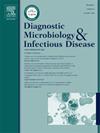AllplexTM stx1/2/2a/2d分型(ASTXT)检测对产志贺毒素大肠杆菌诊断和分型的评价
IF 2.1
4区 医学
Q3 INFECTIOUS DISEASES
Diagnostic microbiology and infectious disease
Pub Date : 2024-12-03
DOI:10.1016/j.diagmicrobio.2024.116645
引用次数: 0
摘要
本研究评估了AllplexTM stx1/2/2a/2d分型(ASTXT)检测(Seegene)对产志贺毒素大肠杆菌的诊断和分型的性能。对18株加标菌株进行分析敏感性和特异性评价,并对114株不含志贺毒素的大肠杆菌进行交叉反应性检测。临床表现评估使用熟练程度面板和76个粪便样本。菌株stx1、stx2、stx2a和stx2d的检测灵敏度分别为4.14 log10 CFU ml-1、4.47 log10 CFU ml-1、4.03 log10 CFU ml-1和4.02 log10 CFU ml-1。误差在5%以内,未观察到交叉反应。ASTXT检测显示与熟练程度小组结果完全一致,并且使用临床粪便样本达到100%阳性和阴性。ASTXT试验在快速检测和分型人类粪便样本中产志贺毒素大肠杆菌方面表现出可靠的性能。本文章由计算机程序翻译,如有差异,请以英文原文为准。
Evaluation of the AllplexTM stx1/2/2a/2d Typing (ASTXT) assay for the diagnosis and typing of Shiga toxin-producing Escherichia coli
This study assessed the performance of the AllplexTM stx1/2/2a/2d Typing (ASTXT) assay (Seegene) for diagnosis and typing Shiga toxin-producing Escherichia coli. Analytical sensitivity and specificity were evaluated using 18 spiked strains, and cross-reactivity was tested on 114 strains including E. coli without Shiga toxin. Clinical performance was evaluated using the proficiency panels and 76 stool samples. Analytical sensitivity was revealed to 4.14 log10 CFU ml−1 for E. coli strain with stx1, 4.47 log10 CFU ml−1 for strain with stx2, 4.03 log10 CFU ml−1 for strain with stx2a, and 4.02 log10 CFU ml−1 for strain with stx2d, respectively. Imprecisions were within 5 % and cross-reactivity was not observed. The ASTXT assay showed perfect agreement with the proficiency panel results and achieved 100 % positive and negative percent agreement using clinical stool samples. The ASTXT assay demonstrated reliable performance for the rapid detection and typing of Shiga toxin-producing E. coli in human stool samples.
求助全文
通过发布文献求助,成功后即可免费获取论文全文。
去求助
来源期刊
CiteScore
5.30
自引率
3.40%
发文量
149
审稿时长
56 days
期刊介绍:
Diagnostic Microbiology and Infectious Disease keeps you informed of the latest developments in clinical microbiology and the diagnosis and treatment of infectious diseases. Packed with rigorously peer-reviewed articles and studies in bacteriology, immunology, immunoserology, infectious diseases, mycology, parasitology, and virology, the journal examines new procedures, unusual cases, controversial issues, and important new literature. Diagnostic Microbiology and Infectious Disease distinguished independent editorial board, consisting of experts from many medical specialties, ensures you extensive and authoritative coverage.

 求助内容:
求助内容: 应助结果提醒方式:
应助结果提醒方式:


